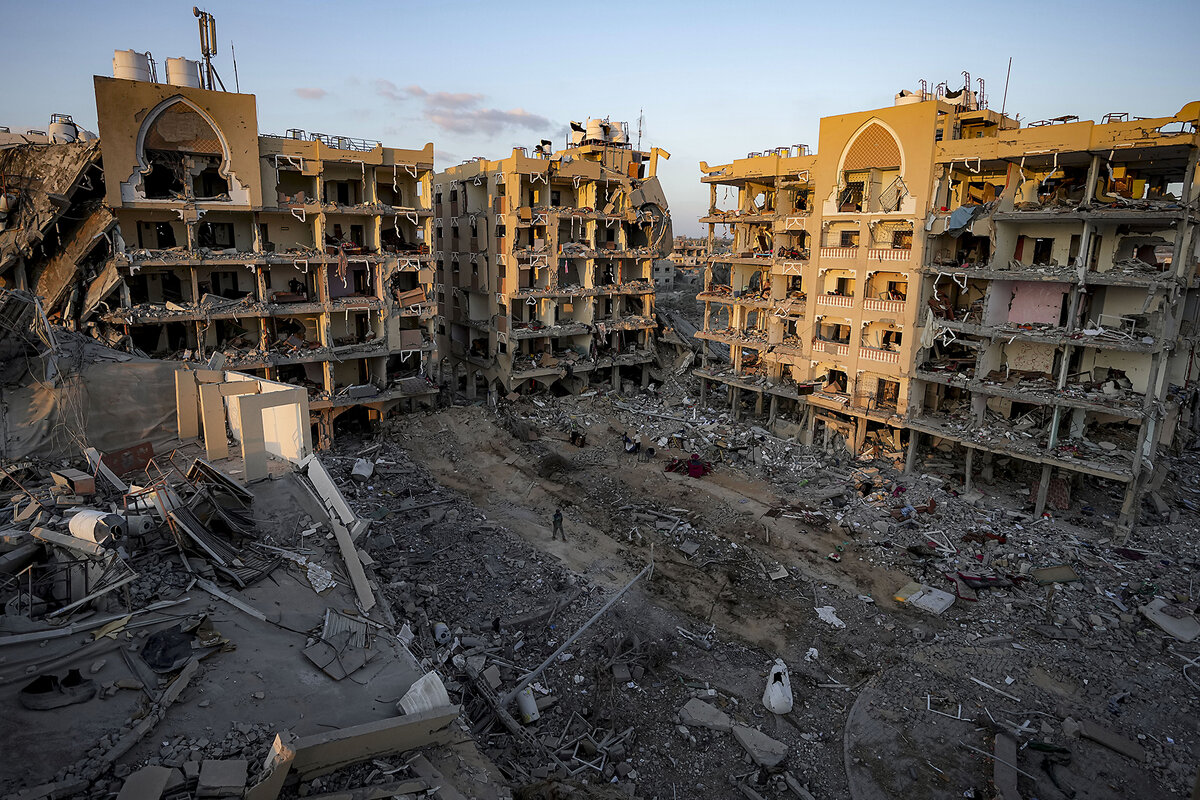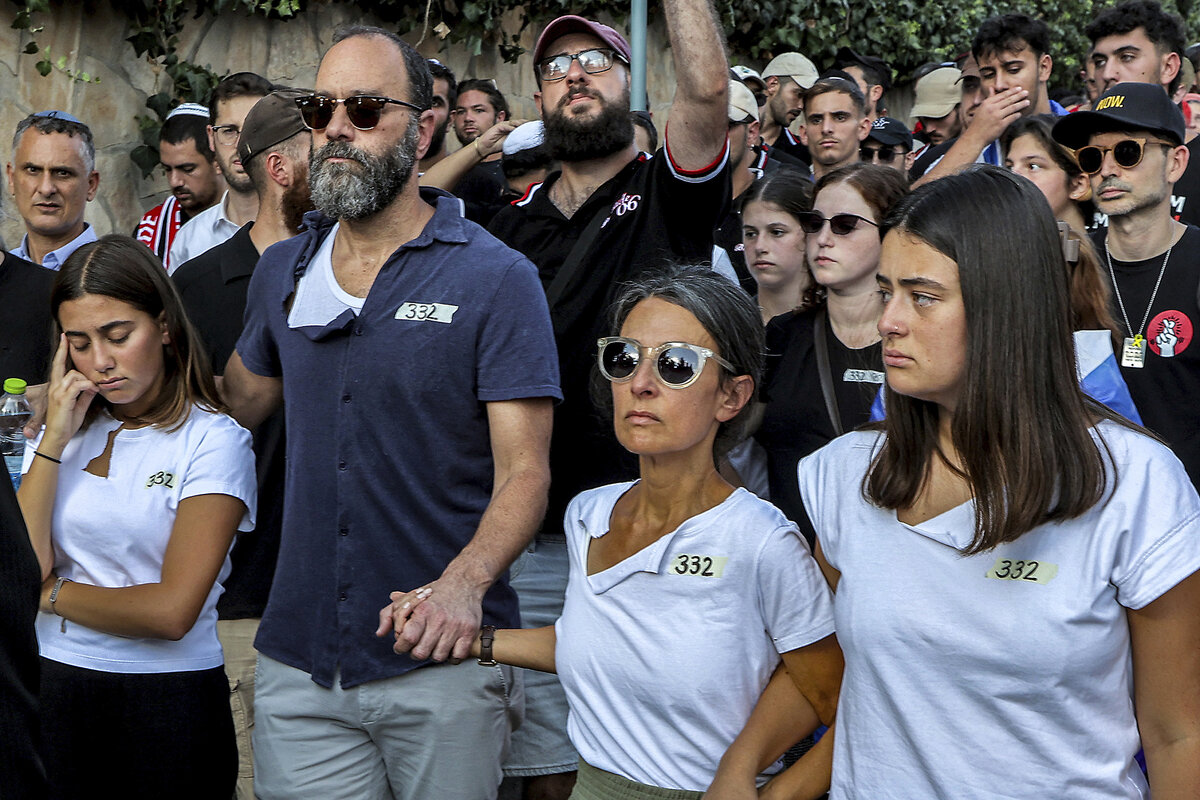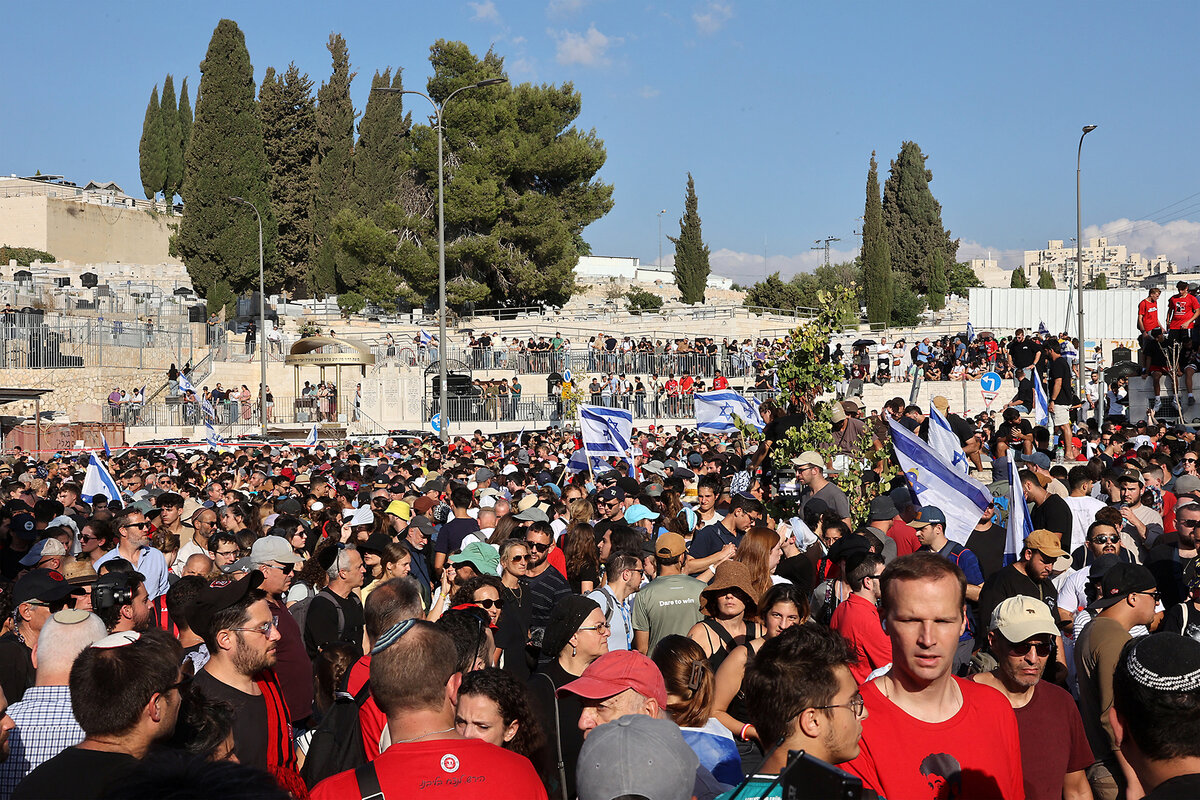‘If I would speak, I would start crying’: Our reporters grapple with loss in Gaza war
Loading...
| Deir al-Balah, Gaza Strip; and Jerusalem
The impact of the war in Gaza is deeply personal for those living it on the ground, including the Monitor’s correspondents, for whom the intersection of their real lives and news events of just the last few days is a devastating reminder.
Friday Ghada Abdulfattah returned to her neighborhood in Deir al-Balah after an Israeli military operation left her family home no more than a teetering pile of rubble.
Why We Wrote This
War correspondents are usually observers to a conflict, even when on the front lines. But in the Israel-Hamas war in Gaza, the Monitor’s writers are, inescapably, intimately involved, as their accounts from the last few days show.
Just weeks ago the house was home to dozens of people in a sprawling, interconnected family. They are all now homeless, rejoining the ranks of the estimated 85% of Gaza residents displaced since Oct. 7.
Saturday night Dina Kraft learned Hersh Goldberg-Polin was one of six Israeli hostages whose bodies had been found in a tunnel under Rafah by Israeli soldiers earlier that day. An autopsy indicated they had been executed by Hamas shortly before.
American-born Hersh, whom Dina had met just a week before he was kidnapped almost 11 months ago, had heeded the message his parents hoped he heard, to “stay strong, survive.”
“There is a surplus of agony on all sides of the tragic conflict in the Middle East,” his father, Jon Polin, told the Democratic National Convention just 13 days ago. “And in a competition of pain, there are no winners.”
Ghada and Dina recount the last days’ events as they experienced them.
The impact of the Israel-Hamas war in the Gaza Strip is deeply personal for those living it on the ground, including the Monitor’s correspondents, for whom the intersection of their real lives and news events of just the last few days is a devastating reminder.
Friday Ghada Abdulfattah returned to her neighborhood in the Gaza town of Deir al-Balah after an Israeli military operation left her family home no more than a teetering pile of rubble.
Just weeks ago the house and compound were home to dozens of people in a sprawling, interconnected family. They are all now homeless, rejoining the ranks of the estimated 85% of Gaza residents who have been displaced since Oct. 7.
Why We Wrote This
War correspondents are usually observers to a conflict, even when on the front lines. But in the Israel-Hamas war in Gaza, the Monitor’s writers are, inescapably, intimately involved, as their accounts from the last few days show.
Saturday night Dina Kraft learned Hersh Goldberg-Polin was one of six Israeli hostages whose bodies had been found in a tunnel under Rafah by Israeli soldiers earlier that day. An autopsy indicated they had been executed by Hamas shortly before.
Hersh, whom Dina had met just a week before he was seriously wounded and kidnapped almost 11 months ago, had heeded the message his parents hoped he heard, to “stay strong, survive.” Their advocacy, especially in the United States where Hersh was born, made him the most recognized of the hostages internationally.
“There is a surplus of agony on all sides of the tragic conflict in the Middle East,” his father, Jon Polin, told the Democratic National Convention just 13 days ago. “And in a competition of pain, there are no winners.”
Ghada and Dina recount the last days’ events as they experienced them.
Ghada returns home to Deir al-Balah
Two weeks after the Israeli military ordered us from our home in Deir al-Balah, its declaration last Thursday allowing some residents to return prompted mixed feelings.
Many were cautiously happy; I was wary.
My father was the first to check on our house. When he returned, he admitted, “We might have to tear it all down.”
On Friday, I accompanied him back to our neighborhood to see the damage myself, taking a donkey cart from our relative’s house nearly 2 miles away.
In the cart, passengers shouted curses at both Hamas and Israel. One man recounted how his relative was killed in Israel’s offensive on Deir al-Balah. He had risked his life to check on his home and paid the ultimate price.
Our neighborhood spoke one word: apocalypse. Houses completely destroyed, partially ruined, or burned, tank shells littering the ground. Buildings that had stood for generations had crumbled.
My street, once lined with olive groves and palm trees, where I would bring my friends to escape the congestion of Gaza City, was now charred and littered with sandy mounds. I can still smell the dust and debris filling the air, an oppressive haze.
Then we reached our house – what was left of it. The five-story house was once home to 27 people: my parents and me, my siblings, in-laws, nieces, and nephews. The Israeli military had reduced my family’s farm to a twisted mass of metal, splintered trees, and broken concrete, gaping with holes.
As I stood there, a wave of disbelief washed over me. It felt surreal, like a scene from a movie – my home, the place I had laughed, cried, and built my life, was dissolving into rubble.
Fear gripped me tightly. Then came the grief. I thought of all the memories held within those walls – the birthday parties, my brother’s dabke folk dances, quiet evenings, and shared meals. It was as if a piece of my soul was being torn to pieces. I felt hollow, like an important part of me had vanished in an instant.
Anger surged next. It felt so unjust, so senseless. In that moment, I felt utterly alone, surrounded by the ruins of my past.
At the onset of the war, our home was struck by numerous artillery shells, damaging the water tanks, the stairs, my niece’s room, and our kitchen. Each time it was hit, we returned, cleaned what we could, and tried to make our home liveable.
But now, I am officially homeless. Given our reconstruction methods, lack of machinery, and Israel’s strict limits on construction material entering Gaza, it may take years, even decades, to rebuild.
This was not the first time war had hit home. In 2014, I lost my family home to that year’s Israel-Hamas war; to replace it, we had built this new house here in the Mahata neighborhood on the outskirts of Deir al-Balah. Almost everyone in our family pitched in.
Now that house, too, is gone. My father’s beloved olive groves are gone. The palm trees, orange trees, grapevines are gone. My room, my awards, my belongings are gone. But others have lost more.
One neighbor who went to check on his house during the Israeli military operation was killed. I watched his siblings sifting through debris, searching for a room to stay in. His mother lamented to me, “How can I return to my house with my son no longer here?”
How can one grieve over mere stones and trees when faced with the larger tragedy of victims – the deceased, the shattered families, the charred bodies of children? Yet as a human with emotions, I also mourn the lost years of effort, the life I had built.
Like hundreds of thousands of other Palestinians in Gaza, if the war ends, we will be homeless. How many times will we have to restart our lives from scratch? Who will compensate us for these lost years?
Since Friday, my father has gone to the ruins of our home every day at 6 a.m. It’s a quiet ritual, one that feels heavy with unspoken emotions. I can see it in his eyes – the shock still lingers, like a ghost haunting us. We all move through our days in a silenced daze, each of us trapped in our own thoughts. We work in silence; we eat in silence. I know if I would speak, I would start crying.
Dina attends a funeral in Jerusalem
The funeral Monday for Hersh Goldberg-Polin was starting soon, and I was still on the bus packed with dozens heading there too. Cars as far as the eye could see were crawling through monster traffic to reach the hilltop Jerusalem cemetery.
Glancing nervously again at the time, I decided if I was going to get there it was going to be by foot. I joined a stream of others hurrying to say farewell to Hersh.
I marveled at the diversity of the crowd: peace activists, ultra-Orthodox, teenage soccer fans, dignitaries.
Most did not know Hersh but felt they did. They knew him through stories his parents told about their curious bright light of a son, as they crisscrossed the globe turning over every stone they thought might help save his and other hostages’ lives.
Hersh’s father is a college friend, and our families were fortunate to have had a holiday meal together just a week before Hersh was abducted.
It was one of those rare nights when the younger generation did not bolt from the table after dessert but lingered to continue a deep conversation about which figures in the world, past or present, we would want to meet.
Hersh’s first response was the Dalai Lama. He also regaled us with stories of his recent Europe trip hitchhiking to music festivals and his plans to travel the world. His energy was electric, his appetite for life so palpable and infectious it put us on a collective high. All the way home and the following day, we kept returning to the subject of Hersh and how much we liked him.
The night of Oct. 7, as we were trying to comprehend reports of abductions and massacres, my son, who had bonded with Hersh over their shared love of Israeli soccer, showed me a TikTok post about someone missing. “Isn’t this Hersh?” he asked. I nodded mutely and then went into the bathroom to cry.
I was in tears again this past Saturday night as I left a protest calling for the Netanyahu government to finally agree to a hostage release deal. I had just received word, then still unofficial, that six hostages had been found dead.
At the top of the list was Hersh’s name. I prayed it was all a terrible mistake. I barely slept and awoke to the nightmare confirmation: It was true. And not only true, but Hersh and the five other young Israelis – whose stories of survival underground for 11 months we will now never know – had been alive just hours before their bodies were found.
This has made their deaths even more gutting. This double senselessness of first the horror of the kidnapping and then of the failure to free them. Sentiment that the government has betrayed the hostages spiked after the killing of Hersh and those with him, and is what drove an estimated half a million Israelis into the streets Sunday and thousands since, including a general strike Monday.
“May he rest in revolution” reads a popular meme in Hersh’s memory.
In her graveside eulogy, Rachel Goldberg-Polin, whose humanity, certainty her son would return, and ability to put words to the agony of her emotions have awed so many, said, “Hersh, for all of these months I have been in such torment worrying about you every millisecond of everyday.
“It was such a specific type of misery that I have never experienced before. I tried hard to suppress the ‘missing you’ part. Because that, I was convinced, would break me. So I spent 330 days terrified, scared, worrying, and frightened. It closed my throat and made my soul throb. ...
“You charmed everyone you ever talked to, old or young. You promoted justice and peace in a way only a young, pure, wide-eyed idealist, can,” she said. “OK, sweet boy, go now on your journey, I hope it’s as good as the trips you dreamed about, because finally, my sweet sweet boy, finally, finally, finally, finally you are free!”
After I waited my turn to put a stone of remembrance on Hersh’s grave, I hitched a ride, and three others piled in after me. Five strangers in the car: me; the driver, whose son went to elementary school with Hersh; a fan of Hersh’s beloved Hapoel Jerusalem soccer team; a young woman whose friend is Hersh’s cousin; and a man from the central city of Rehovot who felt too pained not to come.
We spoke about how unbearable everything currently feels and what might bring change. The conversation continued among two of us walking toward the train station. We agreed Hersh would have loved seeing us connecting, and we admired the tangerine-violet sunset together.
We took a selfie to remember the moment.










